Garage Door Monitor and Opener
Dependencies: X_NUCLEO_COMMON ST_INTERFACES
Introduction
This system implements a simple garage door opener and environmental monitor. The hardware connects to the internet using Wi-Fi then on to the Pelion Device Management Platform which provides device monitoring and secure firmware updates over the air (FOTA). Pelion Device Management provides a flexible set of REST APIs which we will use to communicate to a web application running on an EC-2 instance in AWS. The web application will serve a web page where we can monitor and control our garage..
This project is intended to work on the DISCO-L475VG-IOT01A from ST Microelectronics It implements a simple actuator to drive a relay to simulate pushing the "open" button on older style garage doors which do not use a rolling code interface.
The system is designed to be mounted over the door so that the on board time of flight sensor can be used to detect if the door is open or closed.
The system also monitors temperature, humidity and barometric pressure.
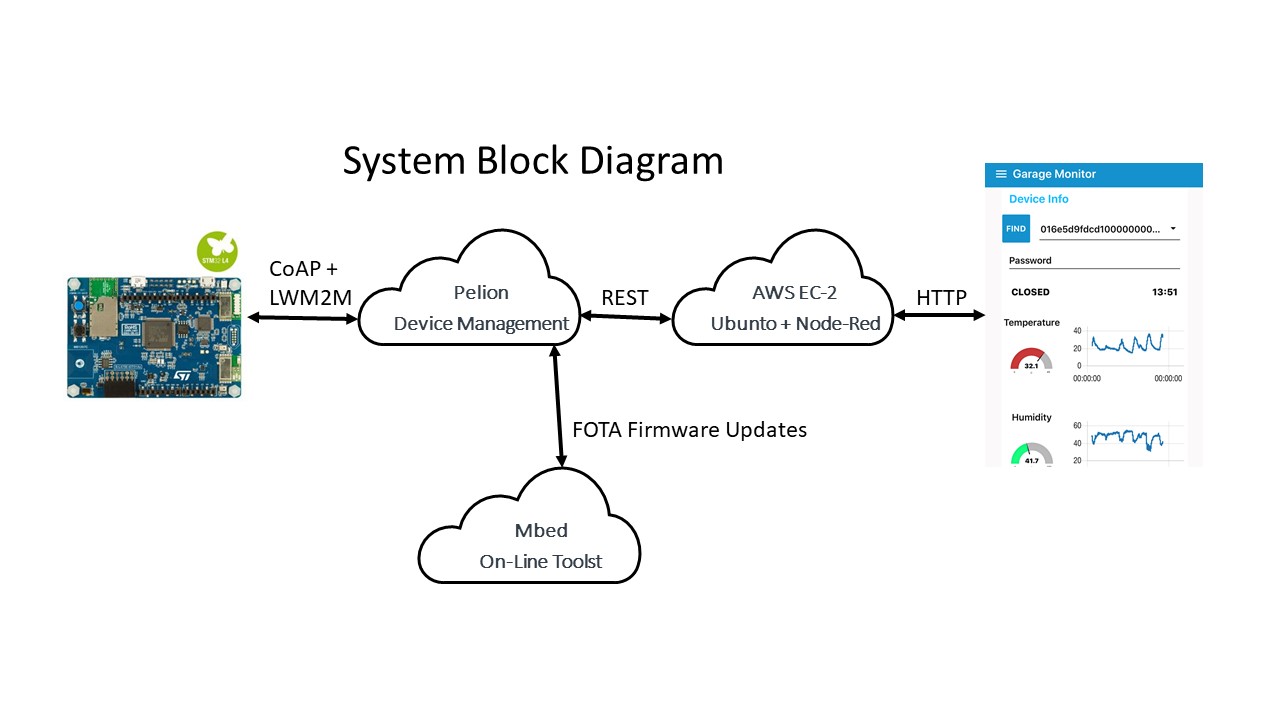
Hardware Requirements:
DISCO-L475G-IOT01A https://os.mbed.com/platforms/ST-Discovery-L475E-IOT01A/
Seeed Studio Grove Relay module https://www.seeedstudio.com/Grove-Relay.html
Seeed Studio Grove cable, I used this one: https://www.seeedstudio.com/Grove-4-pin-Male-Jumper-to-Grove-4-pin-Conversion-Cable-5-PCs-per-Pack.html
Connect to the PMOD connector like this:
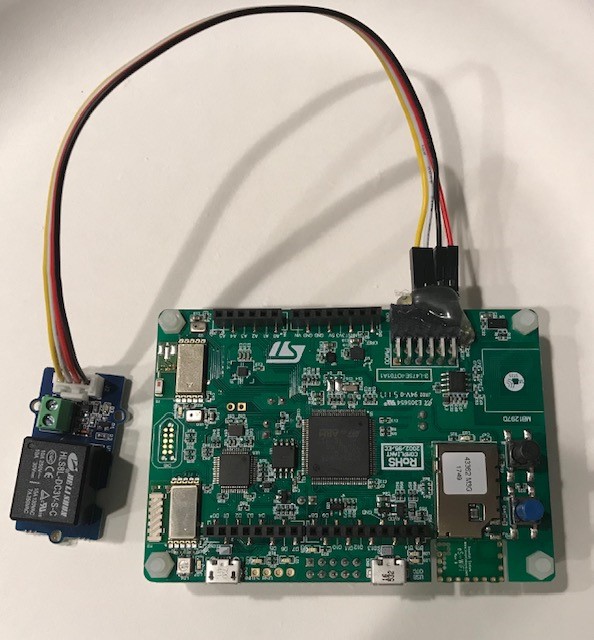
This shows how I installed so that the time of flight sensor can detect when the door is open
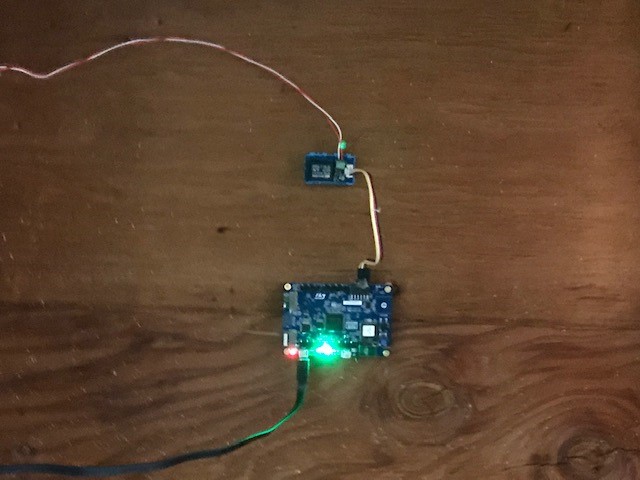
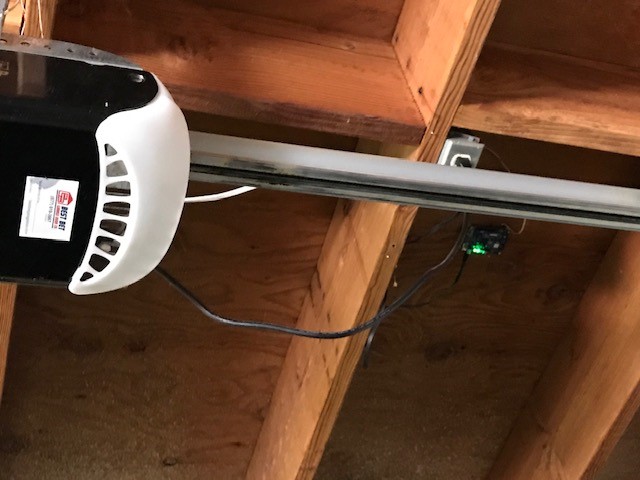
To use the project:
You will also need a Pelion developers account.
I suggest you first use the Pelion quick state to become familiar with Pelion Device Management. https://os.mbed.com/guides/connect-device-to-pelion/1/?board=ST-Discovery-L475E-IOT01A
Web Interface
For my web interface I am running node-red under Ubuntu in an EC2 instance on AWS. This can run for 12 month within the constraints of their free tier. Here is a tutorial: https://nodered.org/docs/getting-started/aws
You will also need to install several node-red add ons:
sudo npm install -g node-red-dashboard
sudo npm install -g node-red-contrib-mbed-cloud
sudo npm istall -g node-red-contrib-moment
After starting node-red import the contents of GarageFlow.txt from the project, pin the flow into the page.
To enable your web app to access your Pelion account you need an API key.
First you will neet to use your Pelion account to create an API key.
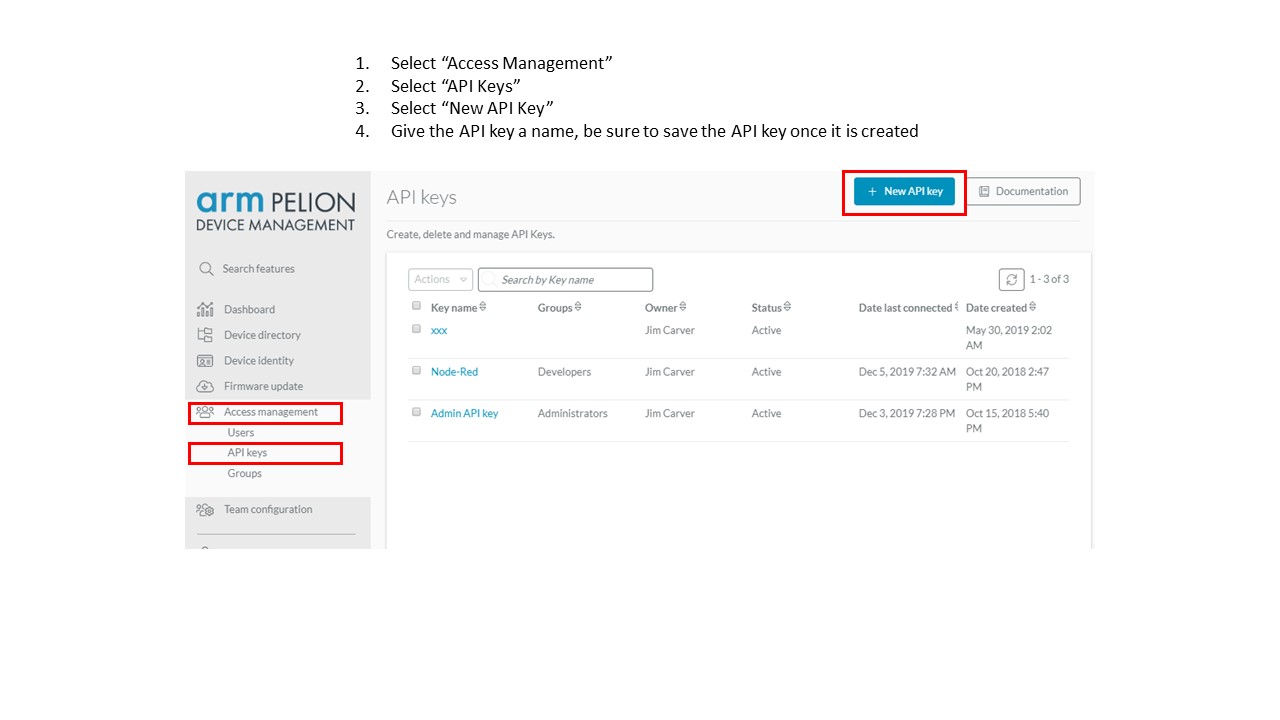
Now we need to apply that API key to your Node-Red flow.
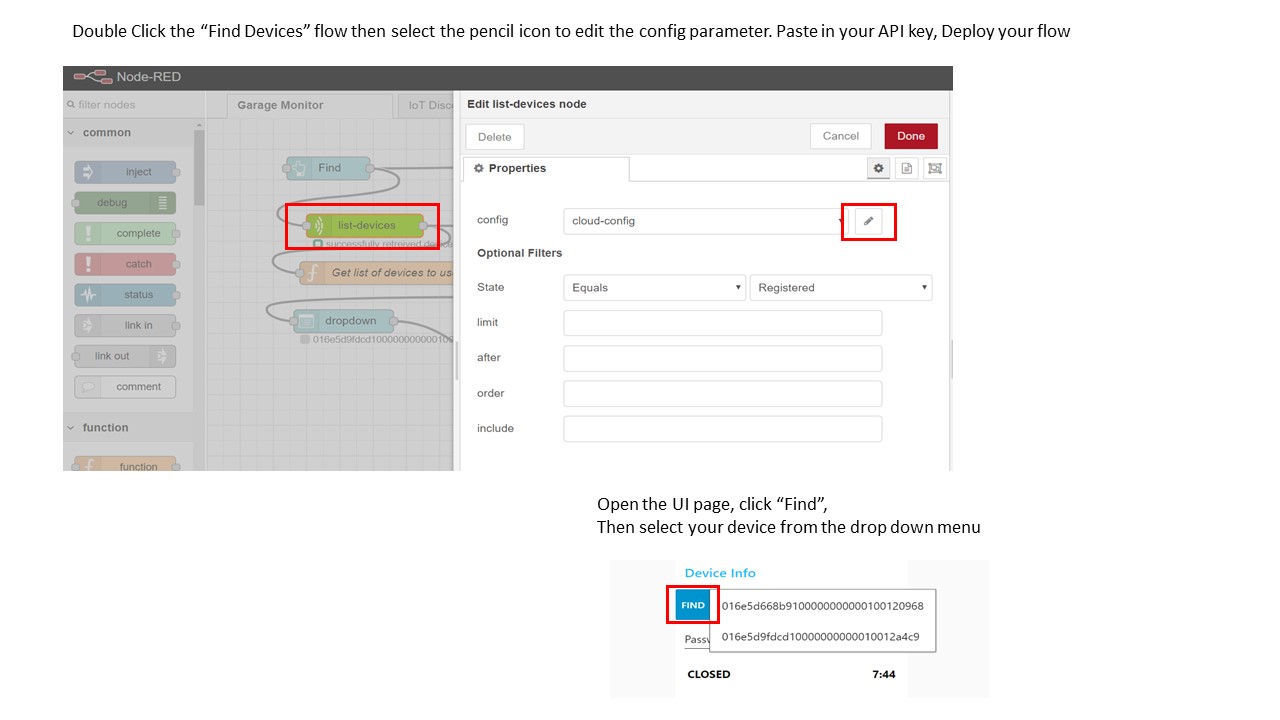
Diff: sensors/LSM6DSL/LSM6DSLSensor.h
- Revision:
- 18:a15bfe7aaebd
--- /dev/null Thu Jan 01 00:00:00 1970 +0000
+++ b/sensors/LSM6DSL/LSM6DSLSensor.h Sun Dec 16 13:53:42 2018 +0000
@@ -0,0 +1,331 @@
+/**
+ ******************************************************************************
+ * @file LSM6DSLSensor.h
+ * @author CLab
+ * @version V1.0.0
+ * @date 5 August 2016
+ * @brief Abstract Class of an LSM6DSL Inertial Measurement Unit (IMU) 6 axes
+ * sensor.
+ ******************************************************************************
+ * @attention
+ *
+ * <h2><center>© COPYRIGHT(c) 2016 STMicroelectronics</center></h2>
+ *
+ * Redistribution and use in source and binary forms, with or without modification,
+ * are permitted provided that the following conditions are met:
+ * 1. Redistributions of source code must retain the above copyright notice,
+ * this list of conditions and the following disclaimer.
+ * 2. Redistributions in binary form must reproduce the above copyright notice,
+ * this list of conditions and the following disclaimer in the documentation
+ * and/or other materials provided with the distribution.
+ * 3. Neither the name of STMicroelectronics nor the names of its contributors
+ * may be used to endorse or promote products derived from this software
+ * without specific prior written permission.
+ *
+ * THIS SOFTWARE IS PROVIDED BY THE COPYRIGHT HOLDERS AND CONTRIBUTORS "AS IS"
+ * AND ANY EXPRESS OR IMPLIED WARRANTIES, INCLUDING, BUT NOT LIMITED TO, THE
+ * IMPLIED WARRANTIES OF MERCHANTABILITY AND FITNESS FOR A PARTICULAR PURPOSE ARE
+ * DISCLAIMED. IN NO EVENT SHALL THE COPYRIGHT HOLDER OR CONTRIBUTORS BE LIABLE
+ * FOR ANY DIRECT, INDIRECT, INCIDENTAL, SPECIAL, EXEMPLARY, OR CONSEQUENTIAL
+ * DAMAGES (INCLUDING, BUT NOT LIMITED TO, PROCUREMENT OF SUBSTITUTE GOODS OR
+ * SERVICES; LOSS OF USE, DATA, OR PROFITS; OR BUSINESS INTERRUPTION) HOWEVER
+ * CAUSED AND ON ANY THEORY OF LIABILITY, WHETHER IN CONTRACT, STRICT LIABILITY,
+ * OR TORT (INCLUDING NEGLIGENCE OR OTHERWISE) ARISING IN ANY WAY OUT OF THE USE
+ * OF THIS SOFTWARE, EVEN IF ADVISED OF THE POSSIBILITY OF SUCH DAMAGE.
+ *
+ ******************************************************************************
+ */
+
+
+/* Prevent recursive inclusion -----------------------------------------------*/
+
+#ifndef __LSM6DSLSensor_H__
+#define __LSM6DSLSensor_H__
+
+
+/* Includes ------------------------------------------------------------------*/
+
+#include "DevI2C.h"
+#include "LSM6DSL_acc_gyro_driver.h"
+#include "MotionSensor.h"
+#include "GyroSensor.h"
+#include <assert.h>
+
+/* Defines -------------------------------------------------------------------*/
+
+#define LSM6DSL_ACC_SENSITIVITY_FOR_FS_2G 0.061 /**< Sensitivity value for 2 g full scale [mg/LSB] */
+#define LSM6DSL_ACC_SENSITIVITY_FOR_FS_4G 0.122 /**< Sensitivity value for 4 g full scale [mg/LSB] */
+#define LSM6DSL_ACC_SENSITIVITY_FOR_FS_8G 0.244 /**< Sensitivity value for 8 g full scale [mg/LSB] */
+#define LSM6DSL_ACC_SENSITIVITY_FOR_FS_16G 0.488 /**< Sensitivity value for 16 g full scale [mg/LSB] */
+
+#define LSM6DSL_GYRO_SENSITIVITY_FOR_FS_125DPS 04.375 /**< Sensitivity value for 125 dps full scale [mdps/LSB] */
+#define LSM6DSL_GYRO_SENSITIVITY_FOR_FS_245DPS 08.750 /**< Sensitivity value for 245 dps full scale [mdps/LSB] */
+#define LSM6DSL_GYRO_SENSITIVITY_FOR_FS_500DPS 17.500 /**< Sensitivity value for 500 dps full scale [mdps/LSB] */
+#define LSM6DSL_GYRO_SENSITIVITY_FOR_FS_1000DPS 35.000 /**< Sensitivity value for 1000 dps full scale [mdps/LSB] */
+#define LSM6DSL_GYRO_SENSITIVITY_FOR_FS_2000DPS 70.000 /**< Sensitivity value for 2000 dps full scale [mdps/LSB] */
+
+#define LSM6DSL_PEDOMETER_THRESHOLD_LOW 0x00 /**< Lowest value of pedometer threshold */
+#define LSM6DSL_PEDOMETER_THRESHOLD_MID_LOW 0x07
+#define LSM6DSL_PEDOMETER_THRESHOLD_MID 0x0F
+#define LSM6DSL_PEDOMETER_THRESHOLD_MID_HIGH 0x17
+#define LSM6DSL_PEDOMETER_THRESHOLD_HIGH 0x1F /**< Highest value of pedometer threshold */
+
+#define LSM6DSL_WAKE_UP_THRESHOLD_LOW 0x01 /**< Lowest value of wake up threshold */
+#define LSM6DSL_WAKE_UP_THRESHOLD_MID_LOW 0x0F
+#define LSM6DSL_WAKE_UP_THRESHOLD_MID 0x1F
+#define LSM6DSL_WAKE_UP_THRESHOLD_MID_HIGH 0x2F
+#define LSM6DSL_WAKE_UP_THRESHOLD_HIGH 0x3F /**< Highest value of wake up threshold */
+
+#define LSM6DSL_TAP_THRESHOLD_LOW 0x01 /**< Lowest value of wake up threshold */
+#define LSM6DSL_TAP_THRESHOLD_MID_LOW 0x08
+#define LSM6DSL_TAP_THRESHOLD_MID 0x10
+#define LSM6DSL_TAP_THRESHOLD_MID_HIGH 0x18
+#define LSM6DSL_TAP_THRESHOLD_HIGH 0x1F /**< Highest value of wake up threshold */
+
+#define LSM6DSL_TAP_SHOCK_TIME_LOW 0x00 /**< Lowest value of wake up threshold */
+#define LSM6DSL_TAP_SHOCK_TIME_MID_LOW 0x01
+#define LSM6DSL_TAP_SHOCK_TIME_MID_HIGH 0x02
+#define LSM6DSL_TAP_SHOCK_TIME_HIGH 0x03 /**< Highest value of wake up threshold */
+
+#define LSM6DSL_TAP_QUIET_TIME_LOW 0x00 /**< Lowest value of wake up threshold */
+#define LSM6DSL_TAP_QUIET_TIME_MID_LOW 0x01
+#define LSM6DSL_TAP_QUIET_TIME_MID_HIGH 0x02
+#define LSM6DSL_TAP_QUIET_TIME_HIGH 0x03 /**< Highest value of wake up threshold */
+
+#define LSM6DSL_TAP_DURATION_TIME_LOW 0x00 /**< Lowest value of wake up threshold */
+#define LSM6DSL_TAP_DURATION_TIME_MID_LOW 0x04
+#define LSM6DSL_TAP_DURATION_TIME_MID 0x08
+#define LSM6DSL_TAP_DURATION_TIME_MID_HIGH 0x0C
+#define LSM6DSL_TAP_DURATION_TIME_HIGH 0x0F /**< Highest value of wake up threshold */
+
+/* Typedefs ------------------------------------------------------------------*/
+
+typedef enum
+{
+ LSM6DSL_INT1_PIN,
+ LSM6DSL_INT2_PIN
+} LSM6DSL_Interrupt_Pin_t;
+
+typedef struct
+{
+ unsigned int FreeFallStatus : 1;
+ unsigned int TapStatus : 1;
+ unsigned int DoubleTapStatus : 1;
+ unsigned int WakeUpStatus : 1;
+ unsigned int StepStatus : 1;
+ unsigned int TiltStatus : 1;
+ unsigned int D6DOrientationStatus : 1;
+} LSM6DSL_Event_Status_t;
+
+/* Class Declaration ---------------------------------------------------------*/
+
+/**
+ * Abstract class of an LSM6DSL Inertial Measurement Unit (IMU) 6 axes
+ * sensor.
+ */
+class LSM6DSLSensor : public MotionSensor, public GyroSensor
+{
+ public:
+ enum SPI_type_t {SPI3W, SPI4W};
+ LSM6DSLSensor(SPI *spi, PinName cs_pin, PinName INT1_pin=NC, PinName INT2_pin=NC, SPI_type_t spi_type=SPI4W);
+ LSM6DSLSensor(DevI2C *i2c, uint8_t address=LSM6DSL_ACC_GYRO_I2C_ADDRESS_HIGH, PinName INT1_pin=NC, PinName INT2_pin=NC);
+ virtual int init(void *init);
+ virtual int read_id(uint8_t *id);
+ virtual int get_x_axes(int32_t *pData);
+ virtual int get_g_axes(int32_t *pData);
+ virtual int get_x_sensitivity(float *pfData);
+ virtual int get_g_sensitivity(float *pfData);
+ virtual int get_x_axes_raw(int16_t *pData);
+ virtual int get_g_axes_raw(int16_t *pData);
+ virtual int get_x_odr(float *odr);
+ virtual int get_g_odr(float *odr);
+ virtual int set_x_odr(float odr);
+ virtual int set_g_odr(float odr);
+ virtual int get_x_fs(float *fullScale);
+ virtual int get_g_fs(float *fullScale);
+ virtual int set_x_fs(float fullScale);
+ virtual int set_g_fs(float fullScale);
+ int enable_x(void);
+ int enable_g(void);
+ int disable_x(void);
+ int disable_g(void);
+ int enable_free_fall_detection(LSM6DSL_Interrupt_Pin_t pin = LSM6DSL_INT1_PIN);
+ int disable_free_fall_detection(void);
+ int set_free_fall_threshold(uint8_t thr);
+ int enable_pedometer(void);
+ int disable_pedometer(void);
+ int get_step_counter(uint16_t *step_count);
+ int reset_step_counter(void);
+ int set_pedometer_threshold(uint8_t thr);
+ int enable_tilt_detection(LSM6DSL_Interrupt_Pin_t pin = LSM6DSL_INT1_PIN);
+ int disable_tilt_detection(void);
+ int enable_wake_up_detection(LSM6DSL_Interrupt_Pin_t pin = LSM6DSL_INT2_PIN);
+ int disable_wake_up_detection(void);
+ int set_wake_up_threshold(uint8_t thr);
+ int enable_single_tap_detection(LSM6DSL_Interrupt_Pin_t pin = LSM6DSL_INT1_PIN);
+ int disable_single_tap_detection(void);
+ int enable_double_tap_detection(LSM6DSL_Interrupt_Pin_t pin = LSM6DSL_INT1_PIN);
+ int disable_double_tap_detection(void);
+ int set_tap_threshold(uint8_t thr);
+ int set_tap_shock_time(uint8_t time);
+ int set_tap_quiet_time(uint8_t time);
+ int set_tap_duration_time(uint8_t time);
+ int enable_6d_orientation(LSM6DSL_Interrupt_Pin_t pin = LSM6DSL_INT1_PIN);
+ int disable_6d_orientation(void);
+ int get_6d_orientation_xl(uint8_t *xl);
+ int get_6d_orientation_xh(uint8_t *xh);
+ int get_6d_orientation_yl(uint8_t *yl);
+ int get_6d_orientation_yh(uint8_t *yh);
+ int get_6d_orientation_zl(uint8_t *zl);
+ int get_6d_orientation_zh(uint8_t *zh);
+ int get_event_status(LSM6DSL_Event_Status_t *status);
+ int read_reg(uint8_t reg, uint8_t *data);
+ int write_reg(uint8_t reg, uint8_t data);
+
+ /**
+ * @brief Attaching an interrupt handler to the INT1 interrupt.
+ * @param fptr An interrupt handler.
+ * @retval None.
+ */
+ void attach_int1_irq(void (*fptr)(void))
+ {
+ _int1_irq.rise(fptr);
+ }
+
+ /**
+ * @brief Enabling the INT1 interrupt handling.
+ * @param None.
+ * @retval None.
+ */
+ void enable_int1_irq(void)
+ {
+ _int1_irq.enable_irq();
+ }
+
+ /**
+ * @brief Disabling the INT1 interrupt handling.
+ * @param None.
+ * @retval None.
+ */
+ void disable_int1_irq(void)
+ {
+ _int1_irq.disable_irq();
+ }
+
+ /**
+ * @brief Attaching an interrupt handler to the INT2 interrupt.
+ * @param fptr An interrupt handler.
+ * @retval None.
+ */
+ void attach_int2_irq(void (*fptr)(void))
+ {
+ _int2_irq.rise(fptr);
+ }
+
+ /**
+ * @brief Enabling the INT2 interrupt handling.
+ * @param None.
+ * @retval None.
+ */
+ void enable_int2_irq(void)
+ {
+ _int2_irq.enable_irq();
+ }
+
+ /**
+ * @brief Disabling the INT2 interrupt handling.
+ * @param None.
+ * @retval None.
+ */
+ void disable_int2_irq(void)
+ {
+ _int2_irq.disable_irq();
+ }
+
+ /**
+ * @brief Utility function to read data.
+ * @param pBuffer: pointer to data to be read.
+ * @param RegisterAddr: specifies internal address register to be read.
+ * @param NumByteToRead: number of bytes to be read.
+ * @retval 0 if ok, an error code otherwise.
+ */
+ uint8_t io_read(uint8_t* pBuffer, uint8_t RegisterAddr, uint16_t NumByteToRead)
+ {
+ if (_dev_spi) {
+ /* Write Reg Address */
+ _dev_spi->lock();
+ _cs_pin = 0;
+ if (_spi_type == SPI4W) {
+ _dev_spi->write(RegisterAddr | 0x80);
+ for (int i=0; i<NumByteToRead; i++) {
+ *(pBuffer+i) = _dev_spi->write(0x00);
+ }
+ } else if (_spi_type == SPI3W){
+ /* Write RD Reg Address with RD bit*/
+ uint8_t TxByte = RegisterAddr | 0x80;
+ _dev_spi->write((char *)&TxByte, 1, (char *)pBuffer, (int) NumByteToRead);
+ }
+ _cs_pin = 1;
+ _dev_spi->unlock();
+ return 0;
+ }
+ if (_dev_i2c) return (uint8_t) _dev_i2c->i2c_read(pBuffer, _address, RegisterAddr, NumByteToRead);
+ return 1;
+ }
+
+ /**
+ * @brief Utility function to write data.
+ * @param pBuffer: pointer to data to be written.
+ * @param RegisterAddr: specifies internal address register to be written.
+ * @param NumByteToWrite: number of bytes to write.
+ * @retval 0 if ok, an error code otherwise.
+ */
+ uint8_t io_write(uint8_t* pBuffer, uint8_t RegisterAddr, uint16_t NumByteToWrite)
+ {
+ int data;
+ if (_dev_spi) {
+ _dev_spi->lock();
+ _cs_pin = 0;
+ data = _dev_spi->write(RegisterAddr);
+ _dev_spi->write((char *)pBuffer, (int) NumByteToWrite, NULL, 0);
+ _cs_pin = 1;
+ _dev_spi->unlock();
+ return data;
+ }
+ if (_dev_i2c) return (uint8_t) _dev_i2c->i2c_write(pBuffer, _address, RegisterAddr, NumByteToWrite);
+ return 1;
+ }
+
+ private:
+ int set_x_odr_when_enabled(float odr);
+ int set_g_odr_when_enabled(float odr);
+ int set_x_odr_when_disabled(float odr);
+ int set_g_odr_when_disabled(float odr);
+
+ /* Helper classes. */
+ DevI2C *_dev_i2c;
+ SPI *_dev_spi;
+ SPI_type_t _spi_type;
+
+ /* Configuration */
+ uint8_t _address;
+ DigitalOut _cs_pin;
+ InterruptIn _int1_irq;
+ InterruptIn _int2_irq;
+
+ uint8_t _x_is_enabled;
+ float _x_last_odr;
+ uint8_t _g_is_enabled;
+ float _g_last_odr;
+};
+
+#ifdef __cplusplus
+ extern "C" {
+#endif
+uint8_t LSM6DSL_io_write( void *handle, uint8_t WriteAddr, uint8_t *pBuffer, uint16_t nBytesToWrite );
+uint8_t LSM6DSL_io_read( void *handle, uint8_t ReadAddr, uint8_t *pBuffer, uint16_t nBytesToRead );
+#ifdef __cplusplus
+ }
+#endif
+
+#endif